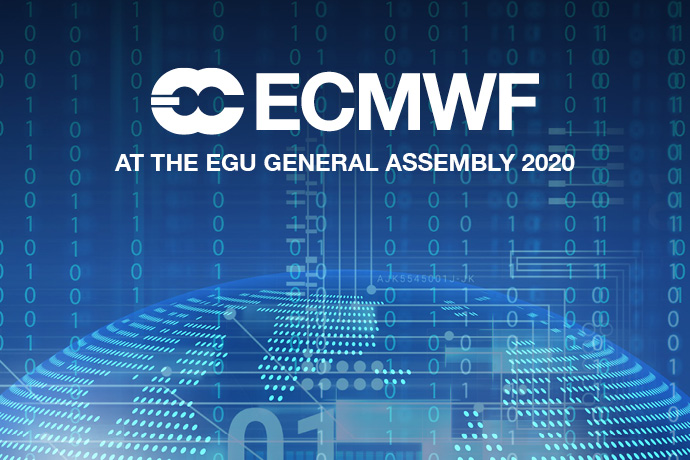

Dozens of ECMWF scientists have prepared presentations for the European Geosciences Union (EGU) General Assembly 2020 from 4 to 8 May, which will take place as an online event this year due to the COVID-19 pandemic.
The following is an overview of the sessions involving ECMWF scientists as the main conveners or authors of presentations (all times are Central European Summer Time, CEST; 'Highlight' means an abstract has been selected by session conveners as being of public interest):
Monday, 4 May 2020
| Time | Title | ECMWF staff |
| 08:30–10:15 | Update of lake cover for NWP modelling | Margarita Choulga |
| 14:00–18:00 | Subseasonal-to-Seasonal Prediction: meteorology and impacts | Frédéric Vitart (convener) |
Tuesday, 5 May 2020
Wednesday, 6 May 2020
| Time |
Title |
ECMWF staff |
| 14:00–15:45 | A Vision for providing Global Weather Forecasts at Point-scale – Highlight | Tim Hewson |
| 16:15–18:00 | Anthropogenic CO2 emission uncertainties | Margarita Choulga |
| 16:15–18:00 | Towards a European operational monitoring capacity for CO2 emissions: the CO2 Human Emission project at ECMWF | Nicolas Bousserez |
Thursday, 7 May 2020
Friday, 8 May 2020
| Time | Title | ECMWF staff |
| 08:30–10:15 | The role of arctic forecast errors in the evolution of northern extra-tropical forecast skill | Thomas Haiden |
| 08:30–10:15 | Evaluation of near-surface temperature forecasts against super-site observations | Polly Schmederer |
| 08:30–10:15 | Monitoring marine heatwaves in CMEMS ocean analysis systems – Highlight | Éric de Boisséson |
| 08:30–10:15 | Benefits of dynamically modelled river discharge input for ocean and coupled system | Hao Zuo |
| 10:45–12:30 | Developing a South‐Eastern European Multi‐Hazard Early Warning Advisory System | Fredrik Wetterhall |
| 14:00–15:45 | Measuring model improvement using surface energy budget process relationships: the impact of a new snow model | Jonathan Day |
